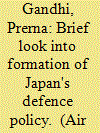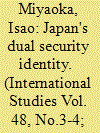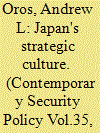| Srl | Item |
| 1 |
ID:
130819


|
|
|
| 2 |
ID:
122922


|
|
|
|
|
| Publication |
2011.
|
| Summary/Abstract |
Since the end of the Cold War, Japan's acceptance and institutionalization of a non-combat military role to aid the US has led to its new identity as a US ally and has transformed the content of its 'peace state' identity. It is this role that has made these two identities more compatible. This article first attempts to measure the long-term shift in Japan's two identities by conducting a content analysis of Japan's Defence White Papers and then seeks to trace the formation process of Japan's dual security identity through which it accepted and institutionalized a non-combat military role. For this analysis, the process is divided into three stages: the Cold War period when its two identities as a 'peace state' and a US ally were considered incompatible, the period of the 1990s when Japan started to accept and institutionalized a non-combat military role, and the period after 11 September 2001 when Japan's dual security identity gradually got established. In the final section, the article discusses the source of a security identity shift in Japan and draws some implications for the future of its security policy.
|
|
|
|
|
|
|
|
|
|
|
|
|
|
|
|
| 3 |
ID:
132869


|
|
|
|
|
| Publication |
2014.
|
| Summary/Abstract |
Japan has shown three distinct strategic cultures since its emergence as a modern state in the 19th century: isolationist and non-military, militarist, and post-World War II strategic culture characterized by great reluctance to use military power abroad, even in collective self-defence. This article examines Japan's strategic culture and the potential for a fourth distinct strategic culture through the broader framework of security identity, arguing that this is evolving but has not changed as much as one might expect due to institutionalized antimilitarism and political support for the security practices it has engendered. Contemporary Japanese strategic culture can be understood through debates over recent Japanese security policy as well as actual changes in security practice. Domestic politics and a changing international environment are likely to lead Japan to a somewhat more active military role in the near term, but an analysis based on the dynamics of Japan's dominant security identity suggests that its strategic culture will continue to show a reluctance to use or develop military power beyond very limited scenarios, despite vocal efforts by some political actors to increase military activity abroad.
|
|
|
|
|
|
|
|
|
|
|
|
|
|
|
|